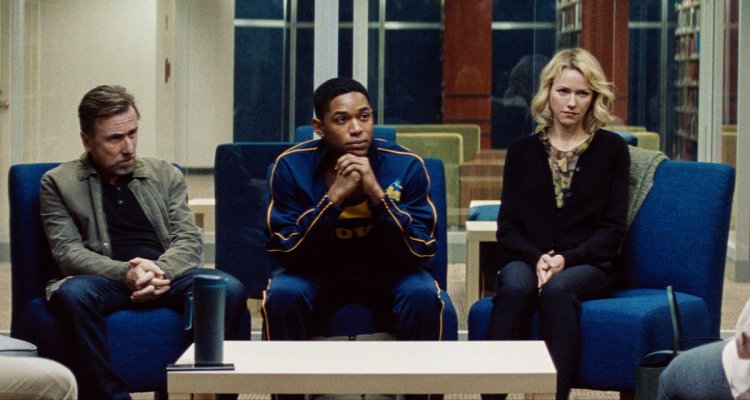In two short years, Trump’s toxic America, has turned race, privilege, and class into incendiary topics while amplifying intolerance, and Julius Onah‘s powerfully constructed “Luce,” mixes all these socio-political subjects into a provocative Molotov cocktail that shatters, burns and leaves no easy answers.
READ MORE: Sundance 2019 Film Festival Preview: 25 Must-See Films
A dissecting, and even confrontational, look into the American Dream, “Luce” features at its core a married couple going through a series of shocking, ambiguous and difficult-to-describe events involving their adopted African-American son, a straight-A student and all-star athlete. It’s one of the most relevant films about today’s poisoned America and, as it stands, is destined to become one of the very best movies of the year.
READ MORE: The 100 Most Anticipated Films Of 2019
Seventeen-year-old Luce (Kelvin Harrison, Jr.) is a beloved jock, a debate-team captain and one of the brightest, most ambitious student of his class. His suburban Virginia high school has all but officially christened Luce, the most popular kid, there isn’t anyone more well-liked, or that is admired by every group, from the nerds to the cool kids. Luce is exemplary. He is, the movie quietly reminds, also African-American and there’s baggage to be mined there. His Caucasian parents Amy and Peter (Naomi Watts, Tim Roth), who adopted him from a war-torn Eritrea, where he was a child soldier, have given him everything in life and Luce has taken advantage of those privileges to build a promising future.
READ MORE: The Most Anticipated Films By Female Filmmakers In 2019
However, Luce’s idealized image of black excellence is challenged when Mrs. Wilson (Octavia Spencer), a black teacher known to be tougher on African-American students, discovers fireworks in his locker. Opening the locker without his consent, she’s been being alarmed by an essay Luce wrote about African writer Frantz Fanon, praising the Pan-Africanist’s support of violence to defeat colonization. This incident isn’t the first time Wilson has rifled through a black student’s locker— a teammate of Luce’s was ejected from the basketball team, losing a college scholarship in the process, after marijuana was discovered in his locker by the intrusive teacher (which lead to his grim downward spiral). Wilson doesn’t confront Luce about the essay or fireworks; she instead goes to his parents, which sparks intense debate about race, class warfare and whether Luce is actually guilty of anything.
READ MORE: The 25 Best Films Of 2019 We’ve Already Seen
“Luce” is a masterful staged social psychodrama, that could also be filed under thriller of intellect, dealing with race and identity in sharp, striking ways. And it’s rather shocking to realize “Luce” comes from the writer-director of last year’s ill-received “The Cloverfield Paradox.” In fact, “Luce” automatically re-positions Onah, a Nigerian-born American filmmaker, at the top of the most promising filmmakers working today.
Truth and trust are central to the story. Harrison (the standout in “It Comes at Night“) is mesmerizing in a role that does not promote sympathy nor disdain; we never honestly know if what he says is the truth or if the smart, savvy adolescent is abusing his position as a targeted minority to evade accountability for the offenses he is being accused of.
Complex, layered and inviting disquisition, “Luce” then selectively plays things elusive. There could be something sinister about Luce or maybe Mrs. Wilson’s are unjustified, and she’s overstepped her boundaries yet again. The movie inches both of these ideas forward, but its left to the audience to litigate them. Things are further pushed to a contentious edge, when the teacher also begins to insinuate that Luce may have even committed sexual assault at a school party, even without evidence and purely based on rumor. The ambiguity of it all would be maddening in lesser hands, but Onah’s craft, turning what could be a talky, theatrical play, into something deeply absorbing, is top notch.
READ MORE: 18 Sundance Film Festival 2019 Premieres That Already Have Our Attention
Spencer gives the performance of her career as Mrs. Wilson, a woman already suffering from her own social baggage, including her drug-addled sister (Marsha Stephanie Blake). This complex character texture leads the audience to wonder if she is just projecting her personal frustrations and resentments towards Luce — who, the movie suggests, has experienced an unearned wealth of privilege, despite the color of his skin. Watts and Roth are commendably brilliant as well, both as good as they’ve ever been in years. Their internal struggle—that the boy they raised may harbor disturbing secrets—makes for brilliantly tense and stressful sequences where Onah barely moves his camera, opting to lock the viewer into the uncomfortable events unfolding. This decision of stasis is bold, unnerving and thrilling throughout, forcing the viewer to come to their own conclusions.
“Luce” is a dangerous minefield and simply crackles with the kind of distressing pressure that is beginning to define America in every conversation we have about race, marginalization, social strata, woke politics and even marriage. It posits itself to tell a story about four characters, all flawed, which, in turn, makes for an exceptionally unsettling exposé on the current bitter state of race, class, gender, and threatening this country. If America is as frail, divided, and fragile as it’s ever been, “Luce” leans its current helplessness and cuts deep. [A]
Check out all our coverage from the 2019 Sundance Film Festival here.

